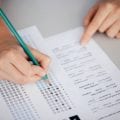
Homeschool Dyslexia Testing
Homeschool Dyslexia Testing, Is your child having difficulties learning to read and write? If your child isn't keeping up with his other children his age concerning reading or writing, then he may have a learning problem. Your child could be dyslexic. There is a chance he is displaying some of the signs and symptoms of childhood dyslexia.
Homeschool Dyslexia Testing Problems
Dyslexic children are bright and intelligent with an exceptional IQ but are often thought of as "lazy" or "stupid" by others the may think they aren't trying or that they have behavioral difficulties. The child may begin to think he's stupid and develops low self-esteem. He tries to hide his disability by misbehaving or daydreaming in class and grows frustrated quickly when confronted with reading, writing or mathematical assignments. In general, such a child will be:
- unable to read, write or spell at a level considered to be healthy for his age
- not able to finish written tests although he may do well orally
- good at non-academic subjects such as music, art, drama, business, woodworking, design or engineering
- able to learn more efficiently by a presentation and visual aids
- able to count but will have difficulties with counting things or money
- unable to do tallies without using his fingers or other such devices; he will get the right answer to simple amounts but can't put the operations down on paper and can't move on to higher maths or algebra
Homeschool Dyslexia Testing Symptoms
Individually, the child will read hesitantly, missing words or make up words, reverse letters or numbers or even words and will not understand what he's learned. Letters, words, numbers, and explanations may cause difficulty and spelling will be inconsistent. There are also some physical manifestations such as:
- a headache, dizziness or stomach ache while reading or a feeling that something is moving and causing a distraction
- vision difficulties although tests reveal nothing
- very keen sight and observational abilities or weak peripheral vision
- hearing sounds not heard by others
- speech difficulties including mistakes, transposition of syllables, words and expressions and stuttering when stressed
- being ambidextrous
- repeated ear infections
- Allergy to food additives, colorings or chemicals
Homeschool Dyslexia Testing Other Concerns
Other signs of dyslexia in kids concern motor skills and may include:
- writing difficulties often because of an unusual way of holding a pencil; writing may be inconsistent or illegible
- clumsiness and a lack of coordination, poor at ball sports or team games, problems carrying out easy tasks that require motor skills
- Confusion between left and right and direction
Also, dyslexic children may have difficulties telling the time, managing time or remembering sequences, events or information that he hasn't personally encountered but will usually have an excellent long-term memory for places, people, and adventures.
Homeschool Dyslexia Testing Behavior
Behavior and development can be a reliable indicator that a child has dyslexia and shouldn't be confused with ordinary childish behavior. Action can be obsessive or compulsive and be at either end of the rainbow such as:
- neatness or messiness
- too loud or too quiet
Growth can be either very quick or very slow when it comes to crawling, walking, and talking and the child may be a very deep or extremely light sleeper, or he may wet the bed after it is common to do so.
The child will have a high or low pain threshold. He may also be overly sensitive or emotionally. Any of these symptoms of dyslexia in children will develop in periods of confusion, stress, or illness.
Homeschool Dyslexia Testing Summary
A child who is demonstrating any of these actions or traits should be tested as soon as sign appear. If the problems continue unchecked they could get worse and more difficult to treat.







